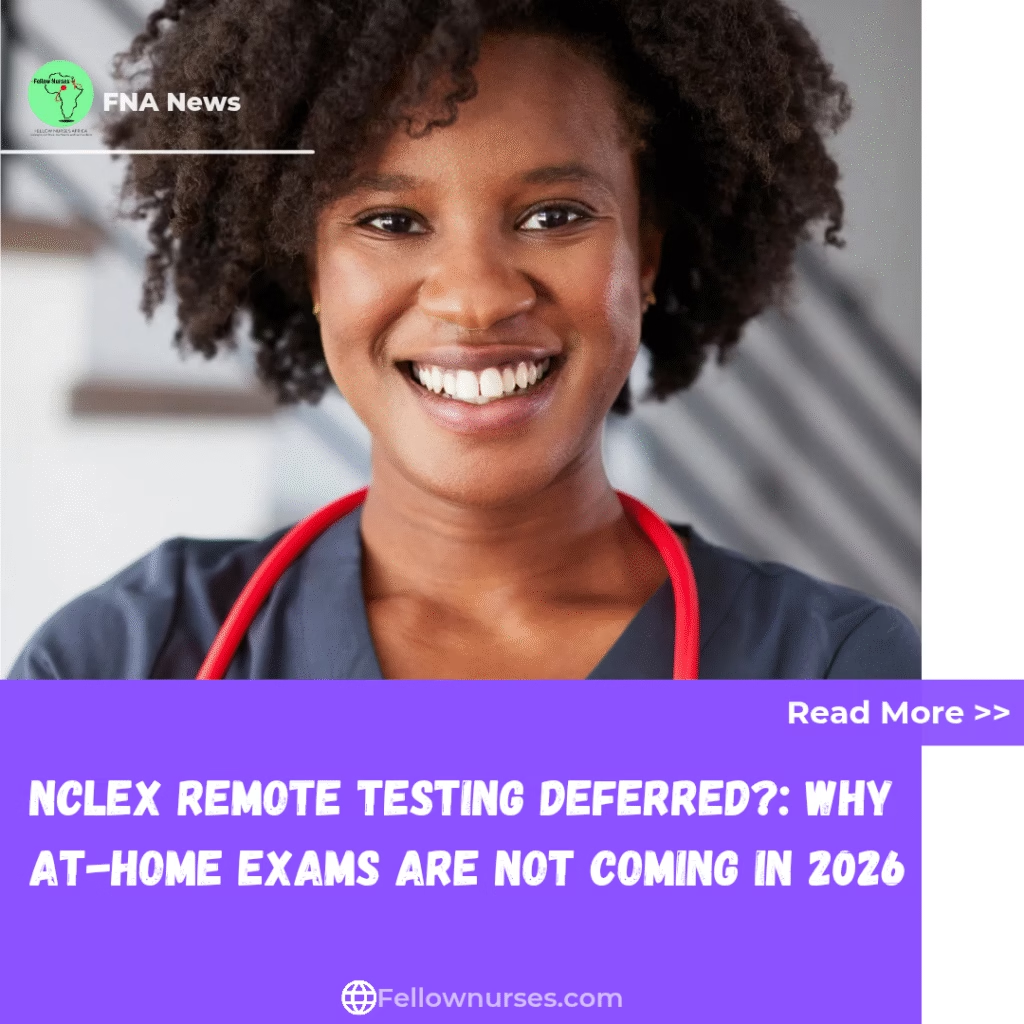
NCLEX Remote Testing Deferred? : Why At-Home Exams Are Not Coming in 2026
By Fellow Nurses Africa News
Lagos, Nigeria – September 14, 2025
As nursing professionals and aspiring graduates gear up for the 2026-2029 NCLEX cycle, questions surrounding the feasibility of remote proctoring have taken center stage. In a recent Facebook Live session, esteemed educator Professor Regina M. Callion, MSN, RN, founder of ReMar Review, voiced strong reservations about the National Council of State Boards of Nursing’s (NCSBN) plans for at-home NCLEX testing, predicting that the initiative will not launch within the upcoming test plan period. Her insights, rooted in practical concerns over technology and equity, echo broader uncertainties in the nursing education community amid ongoing NCSBN developments.
The session, streamed on ReMar Review’s platform and titled “NCLEX at Home?! 2026-2029 Test Plan Updates,” attracted significant attention from students navigating the high-stakes world of licensure exams. Callion, celebrated for her empowering approach and resources like the ReMar V2 program, dissected the proposed changes with a focus on realism. “NCLEX at Home doesn’t make sense,” she asserted, highlighting the lack of leniency for candidates testing from personal environments.
She warned that stringent technical requirements—such as private high-speed internet, webcams, microphones, and secure, distraction-free spaces—could prove insurmountable barriers.
“Most people will not pass through the technical bit. Most people will fall,”
Callion cautioned, emphasizing that public networks in settings like hotels or libraries would be prohibited, effectively judging candidates on their technology and surroundings as much as their knowledge.
This skepticism aligns with the NCSBN’s current trajectory, where remote proctoring remains in the developmental phase rather than ready for imminent rollout. Recent board updates reveal continued efforts to “develop and test remote proctoring using AI security technology,” including candidate talk-aloud sessions to refine usability. While the organization has explored NCLEX Online as a response to pandemic-era demands, no firm 2026 launch date has been confirmed, fueling speculation of deferral.
“Remote proctoring for NCLEX is not happening in 2026-2029. Possibly later in the future,”
Callion predicted, pointing to unresolved challenges in scalability, security, and fairness that could delay implementation beyond the current cycle.
Against this backdrop, the core 2026 NCLEX-RN and NCLEX-PN test plans appear stable, with minimal adjustments set to take effect on April 1, 2026. Key updates include a refined category rename from “Safety and Infection Control” to “Safety and Infection Prevention and Control,” incorporating contemporary emphases on protocols like those informed by post-COVID learnings. Question distributions across Client Needs categories—such as Management of Care (15-21% for RN) and Pharmacological Therapies (10-16% for PN)—remain unchanged, preserving the Next Generation NCLEX (NGN) format’s focus on clinical judgment.
New activity statements may address emerging areas like telehealth and personalized medicine, but these evolutions are evolutionary, not disruptive.
For nursing candidates, the potential deferral of at-home testing underscores the importance of adaptability. Callion advised prioritizing in-person preparation while mastering NGN case studies and safety protocols.
“Whether in a center or someday at home, you must master the content,”
she encouraged, promoting tools like adaptive question banks to build resilience. As NCSBN panels convene this fall to recommend passing standards and finalize details for January 2026 publication, the nursing community awaits clarity on remote options amid persistent workforce demands.
In an industry grappling with shortages and innovation, Callion’s perspective serves as a measured reminder: true accessibility must balance ambition with equity.
Fellow Nurses Africa is the independent voice of African nursing, we educate, inform and support nurses across Africa.










